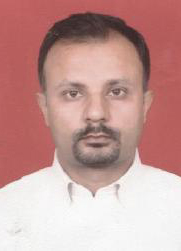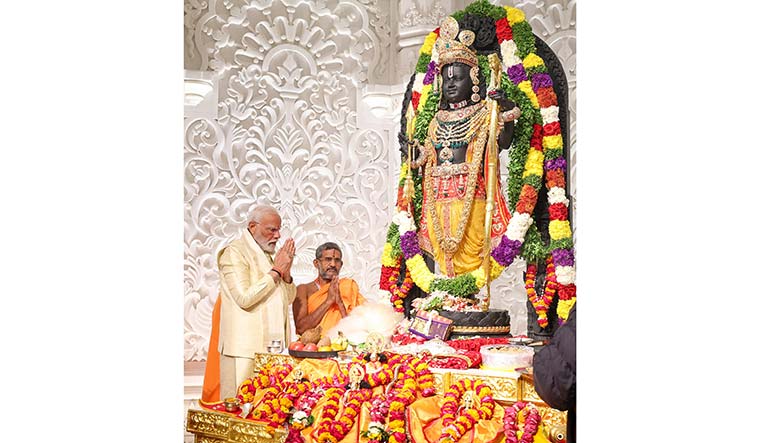The black stone idol of five-year-old Ram, with its benign smile and innocence, has given millions of Hindus an enduring image of their beloved god. The consecration of the idol at the Ram Temple in Ayodhya on January 22 was a defining moment in the history of India.
The political leadership under Prime Minister Narendra Modi has combined the spiritual with the temporal, and Ram’s vision with the nation’s future. Held in the presence of invited elite as well as Hindu saints and temple construction workers, the consecration of the idol was seen as a celebration of India’s religious and cultural identity, with Modi saying that Ram’s homecoming was a break from 1,000 years of slavery, a reference to Mughal and British rule.
With helicopters showering petals on the audience, the scene was similar to Republic Day parades where the country’s military might is displayed along with symbols of its economic and social prowess.
While the prime minister focused on Ayodhya, BJP ministers and senior leaders fanned across the country to participate in events that presented the consecration as a national festival. If Jawaharlal Nehru’s ‘Tryst with Destiny’ speech on the eve of India’s independence gave vision to a fledgling nation, Modi’s Ram Mandir address offered a different vision. “This temple is not just a mere shrine; it is the manifestation of Bharat’s vision, philosophy and insight,” he said. “It is a temple of national consciousness in the form of Lord Ram. Ram is the faith of Bharat; Ram is the foundation of Bharat. Ram is the thought of Bharat; Ram is the constitution of Bharat. Ram is the consciousness of Bharat.”
With the consecration ceremony, not only has Modi established the Hindu identity of the country, he has done so without tinkering with the Constitution. Notably, he is known to have prostrated at only two places―Parliament and the Ram Mandir. In politics, he has sought to combine them.
With the consecration, he has cemented his legacy as a strong leader who delivers and is not shy of wearing his religion on his sleeve. India’s political history can be seen through the journeys of it prime ministers, and Modi has carved a distinct identity for himself. “Prime Minister Modi is leading a project of civilisational resurrection,” said BJP MP Rakesh Sinha. “Earlier, the Ram Temple was seen as polemics between Hindus and Muslims, but this was a cultural leap forward. He addressed the civilisational continuity of India and defined Ram, who is inclusive and transcends time and geographical limits.”
In Hindu tradition, Ram is not seen as a giver god to whom people go with their aspirations; instead, he sought betterment of society and idealism. Modi’s definition of Ram centres on imagining India’s culture through spiritual beliefs. He went where no other prime minister has gone before without fear of reprisal from the political class and diverse communities.
“In this regard, Prime Minister Modi’s action is unapologetic,” said Sinha. “That is where Nehru and Modi differ.” In 1951, he said, Nehru wrote to chief ministers that the western world intensely disliked what communal organisations were doing on the issue of the Somnath Temple. “Modi, however, goes by the likes and the dislikes of the Indian people,” he said. “Both are unapologetic in their approaches.”
But unlike the Somnath Temple restoration, where the issue was confined to the Hindu cultural and political elite, the Ram Mandir movement was taken forward by common people. Sinha, also an RSS ideologue, compared Modi to past rulers like Vikramaditya and Ahilya Bai Holkar who had worked for religious causes. “He is a raja of India. Though raja is not a term used in democracy, it is an appropriate term for those who work selflessly and consciously for the welfare of people. We are a spiritual democracy,” said Sinha.
The Congress apparently did not agree. It refused to participate in the ceremony that Rahul Gandhi described as a “Narendra Modi event and political function”. The Congress leader is currently on his Bharat Jodo Nyay Yatra focused on social justice promises.
The mass celebrations anchored by the BJP and the RSS, across the country and in temples abroad, have left opposition parties searching for an appropriate response. Their challenge is to find a way to counter the BJP’s messaging ahead of the Lok Sabha elections due in April-May.
With the election campaign set to begin soon, the BJP leadership would go after the Congress for refusing to participate in the event. To minimise the damage, INDIA bloc leaders might visit Ayodhya soon. Interestingly, the Congress government in Himachal Pradesh, where 98 per cent of the population is Hindu, joined in the celebrations and declared a full-day holiday on January 22. Chief Minister Sukhvinder Sukhu even promised to build an imposing Ram idol in Shimla.
While the BJP is likely to reap the electoral benefits of the Ram Mandir in the Hindi heartland, Modi had also visited temples in the south to strengthen the Hindu sentiment. How this translates into votes in a traditionally BJP-averse region, except Karnataka, remains to be seen.
Moreover, in an answer to the opposition’s focus on social justice, the Modi government announced a Bharat Ratna for former Bihar chief minister Karpoori Thakur, who is often hailed as a messiah of OBC politics and social justice.
And as for any potential anti-incumbency effect against local MPs, the BJP hopes that the temple would override it. “We will win the elections,” said BJP spokesperson Gopal Krishna Agarwal. “People will support us. The temple is not an election issue for us. It was a matter of civilisation. We will go to people with the work the government has done.”
Reacting to charges that the BJP politicised the temple ceremony, he said, “The opposition may continue to call it political, but people have answered them as they celebrated it. If political parties do not have a connect with the people, how will they survive?”
The 2024 elections will show what indeed connects with the people.


